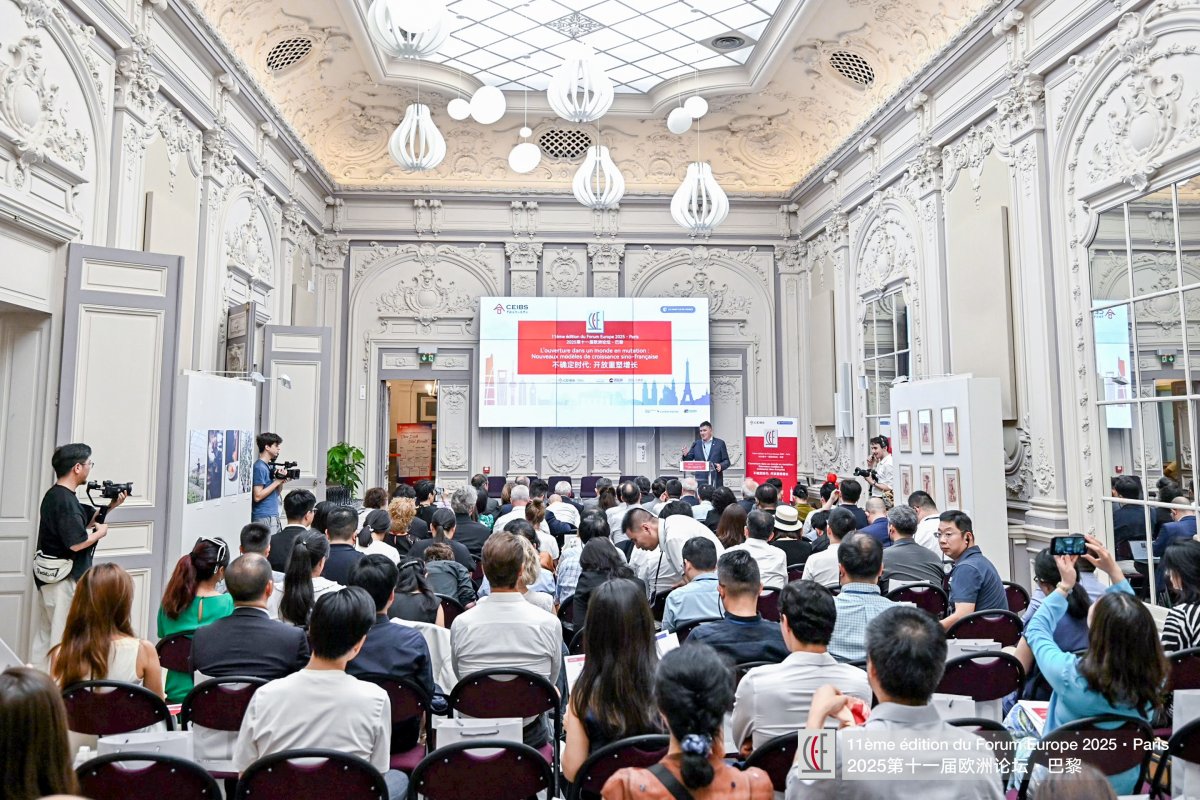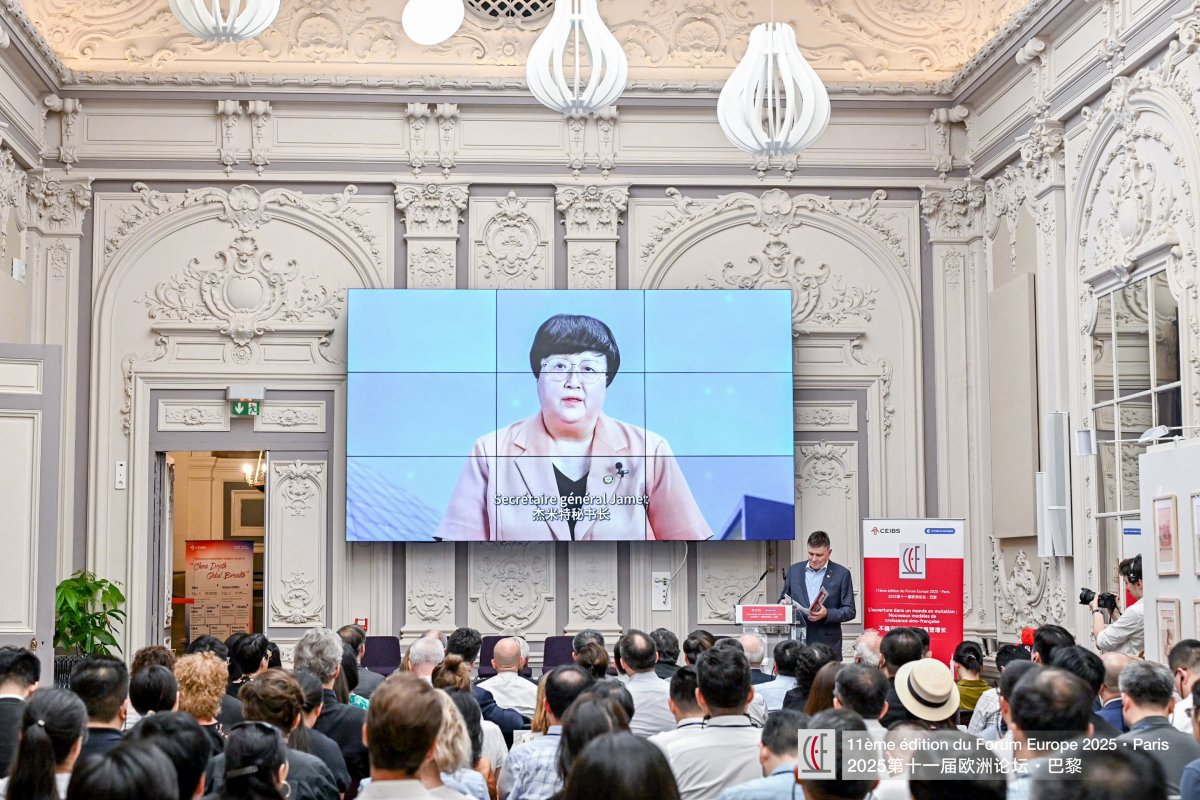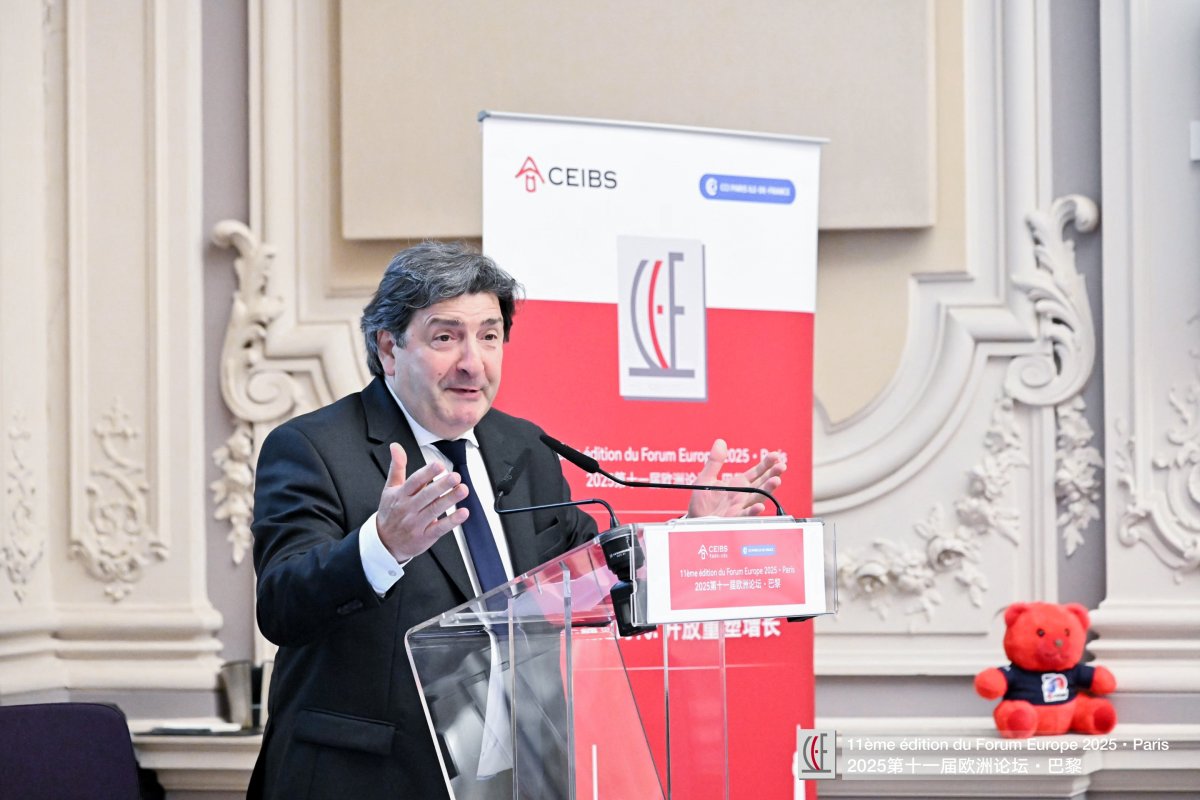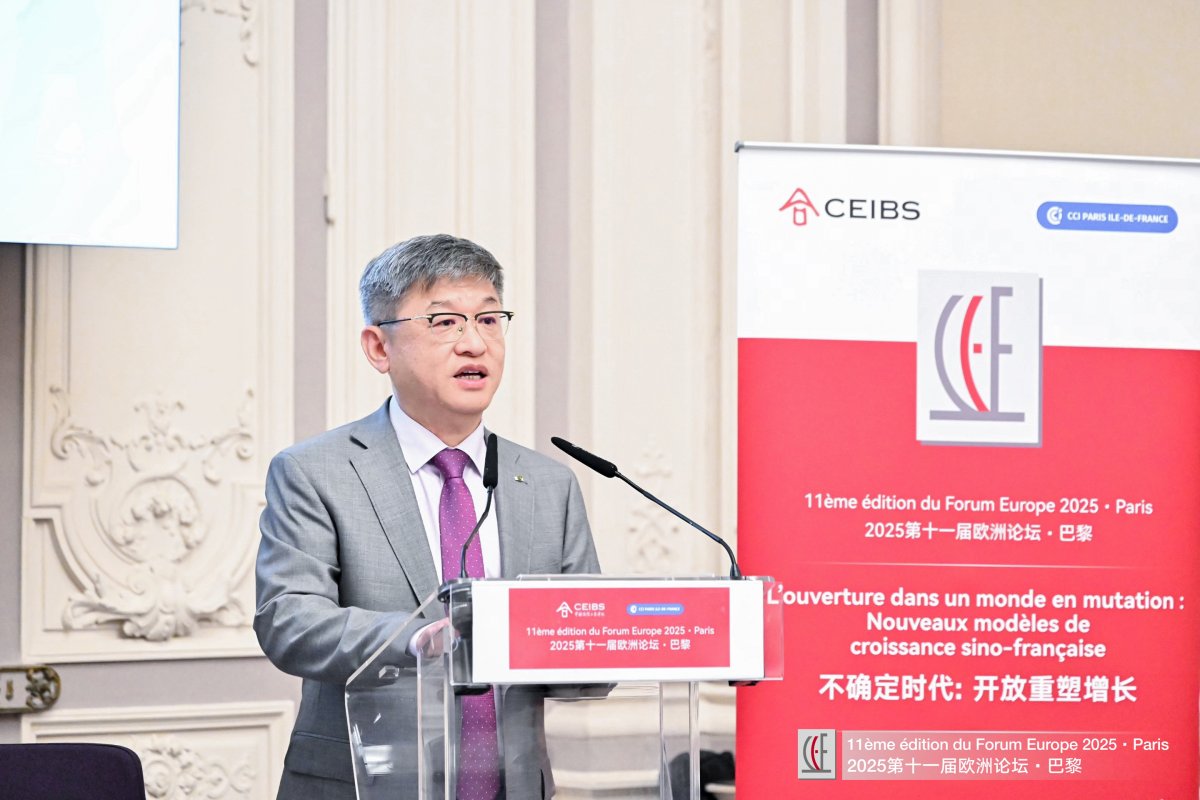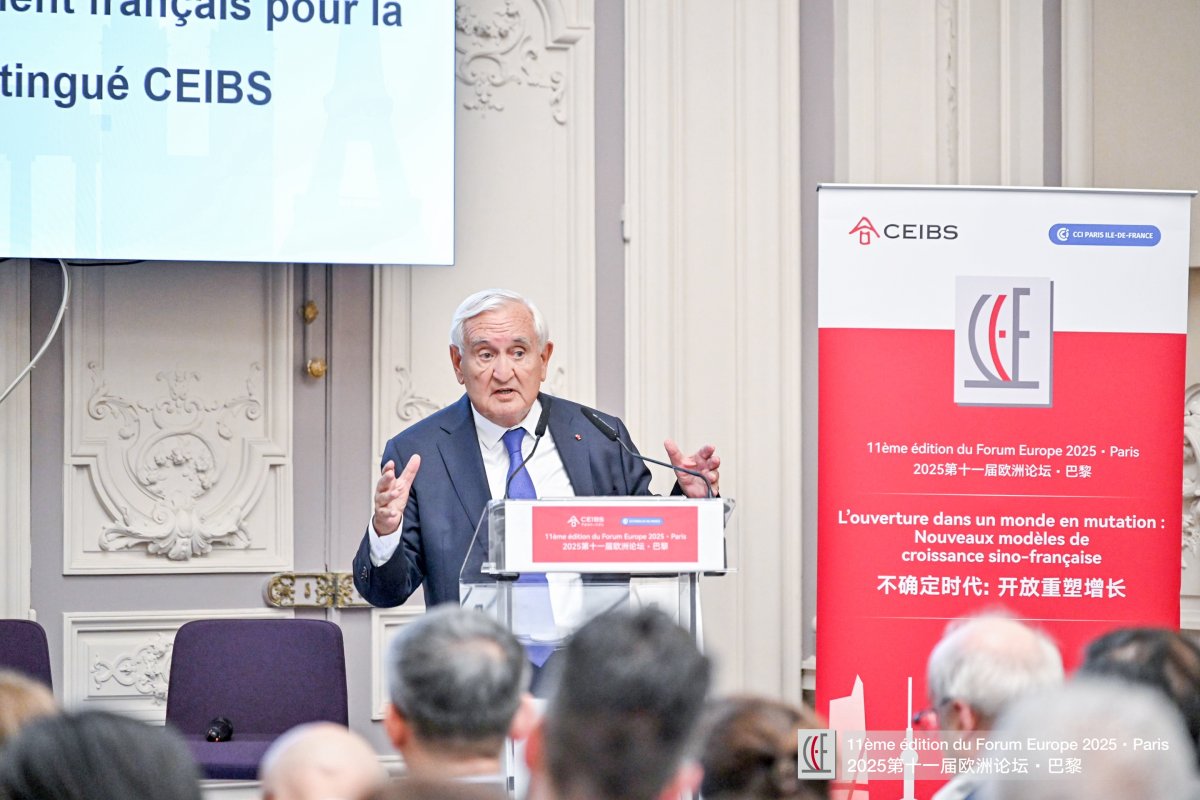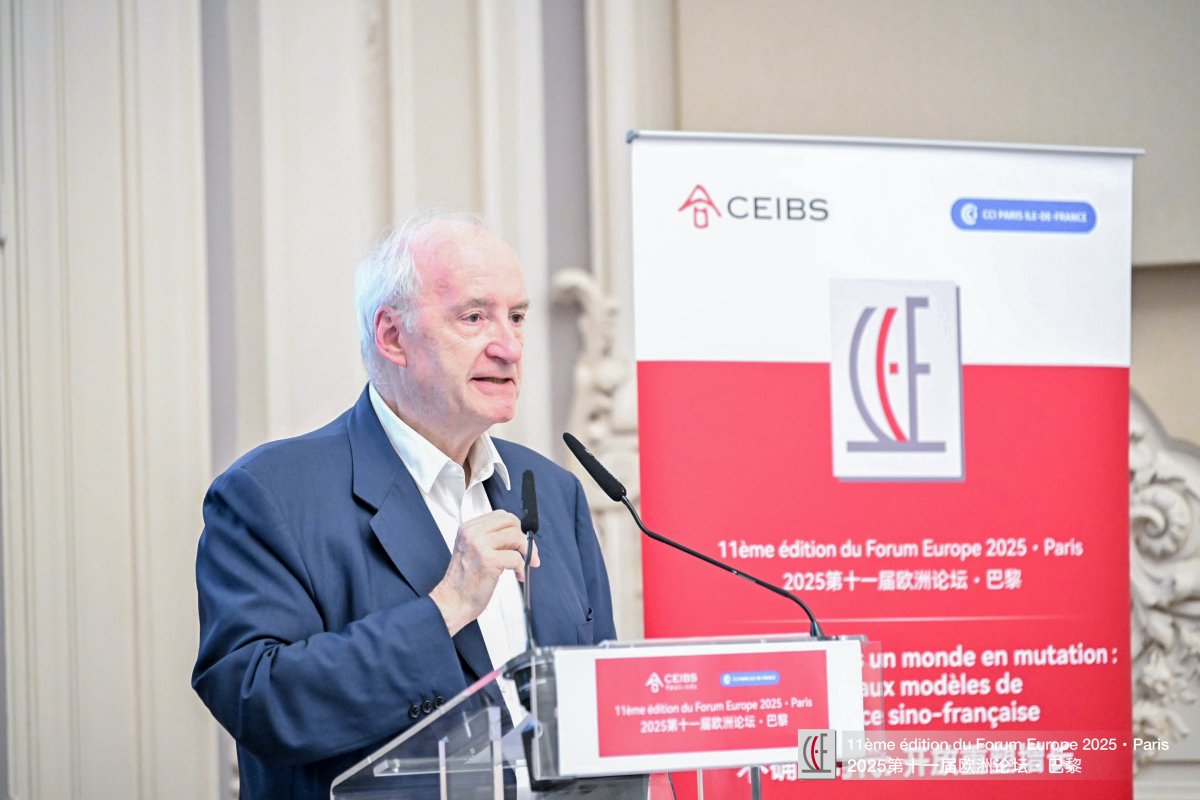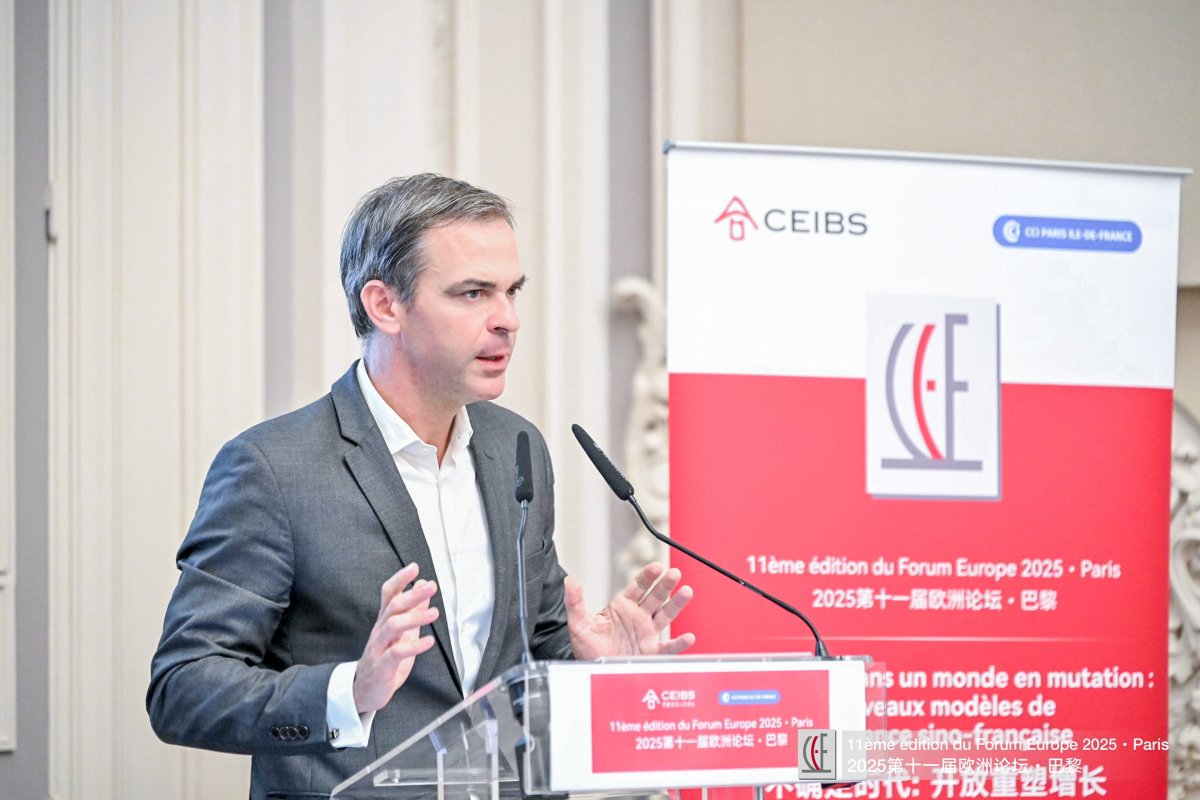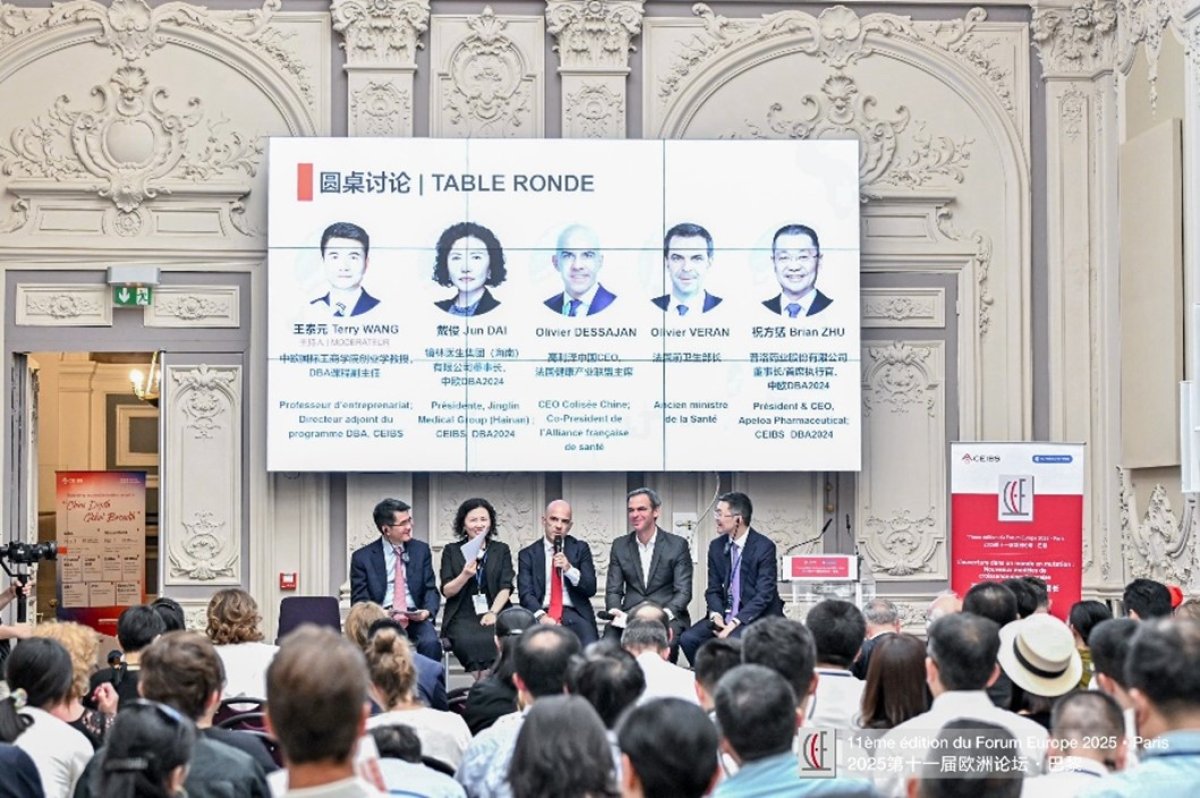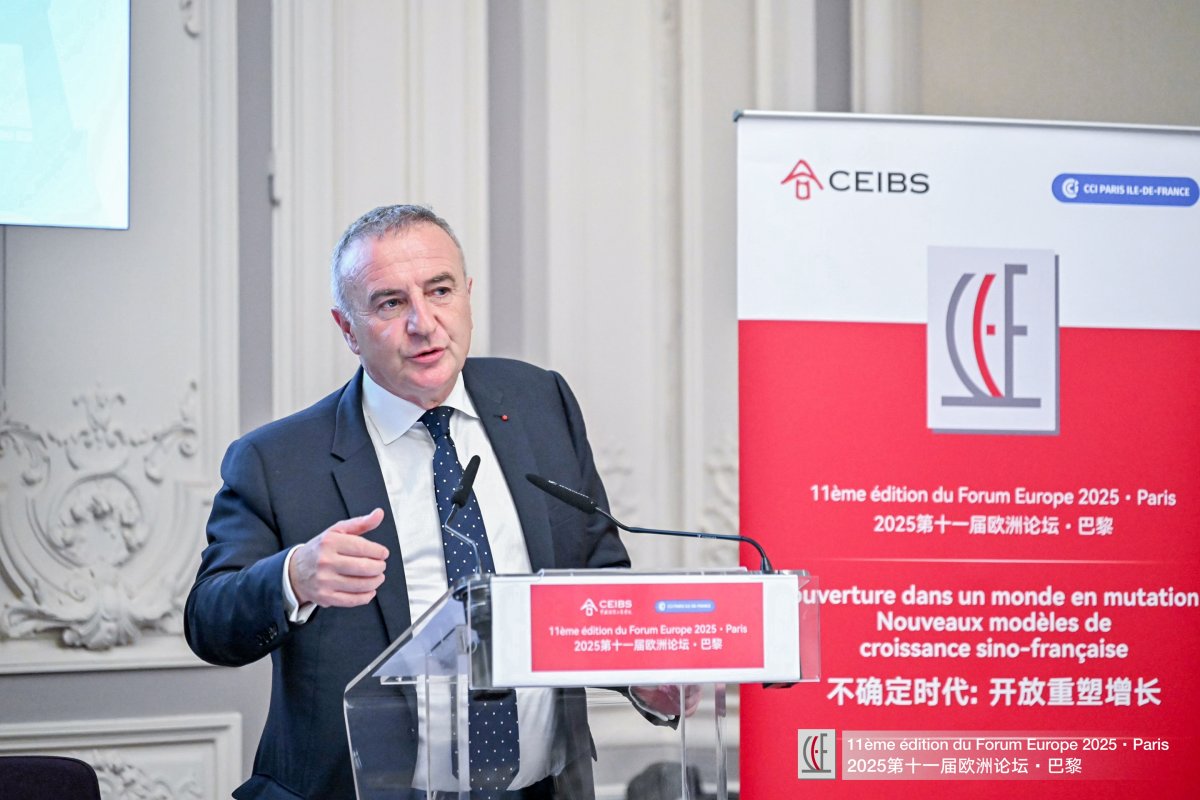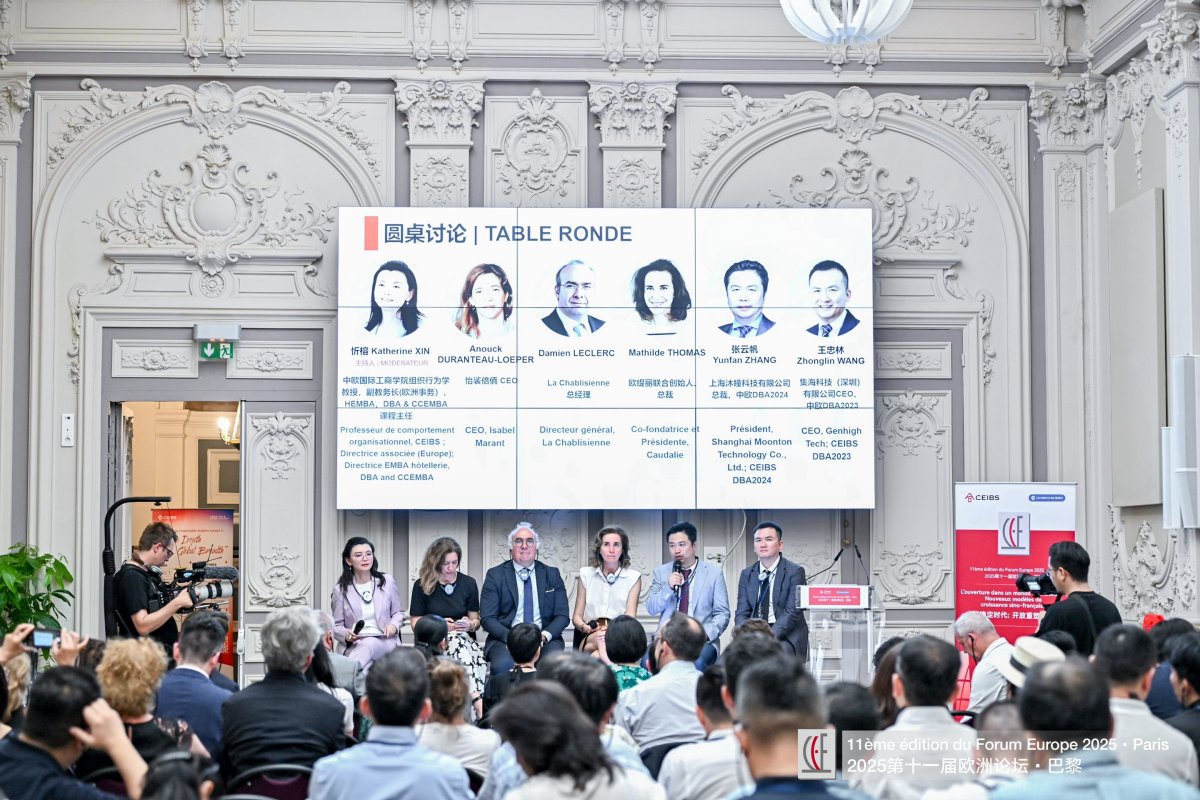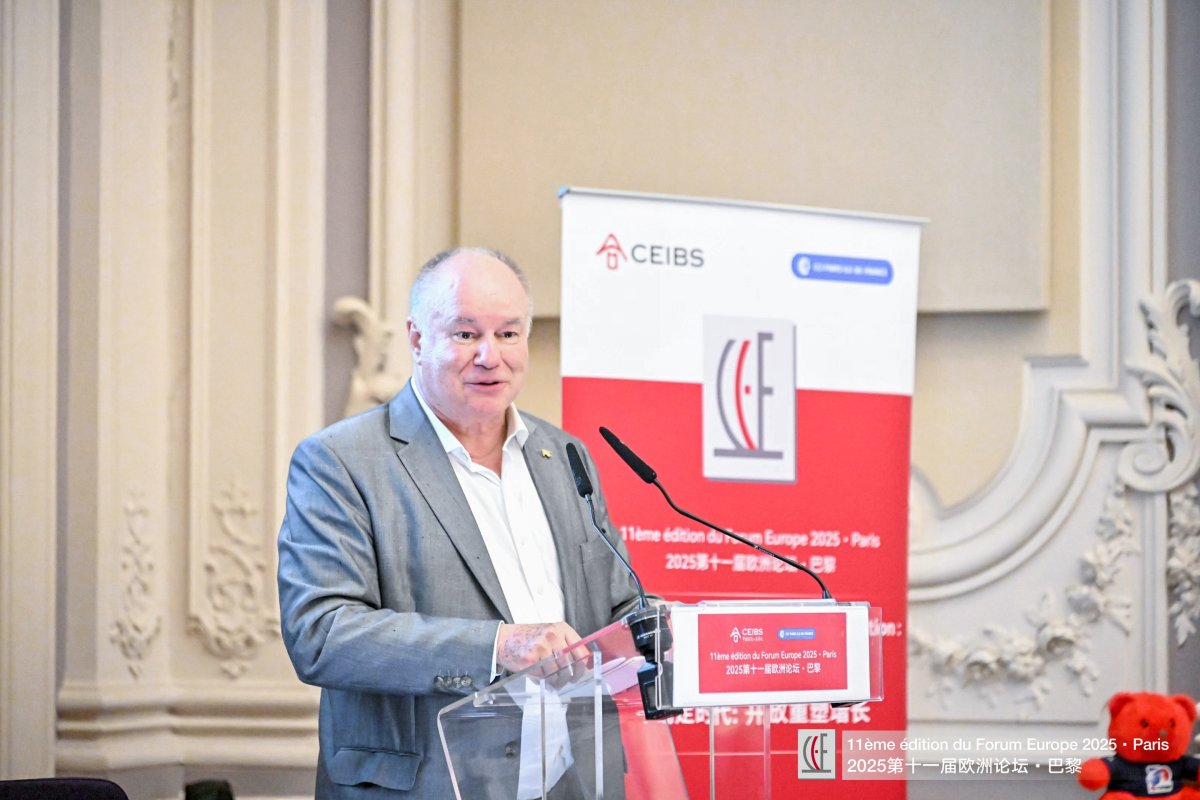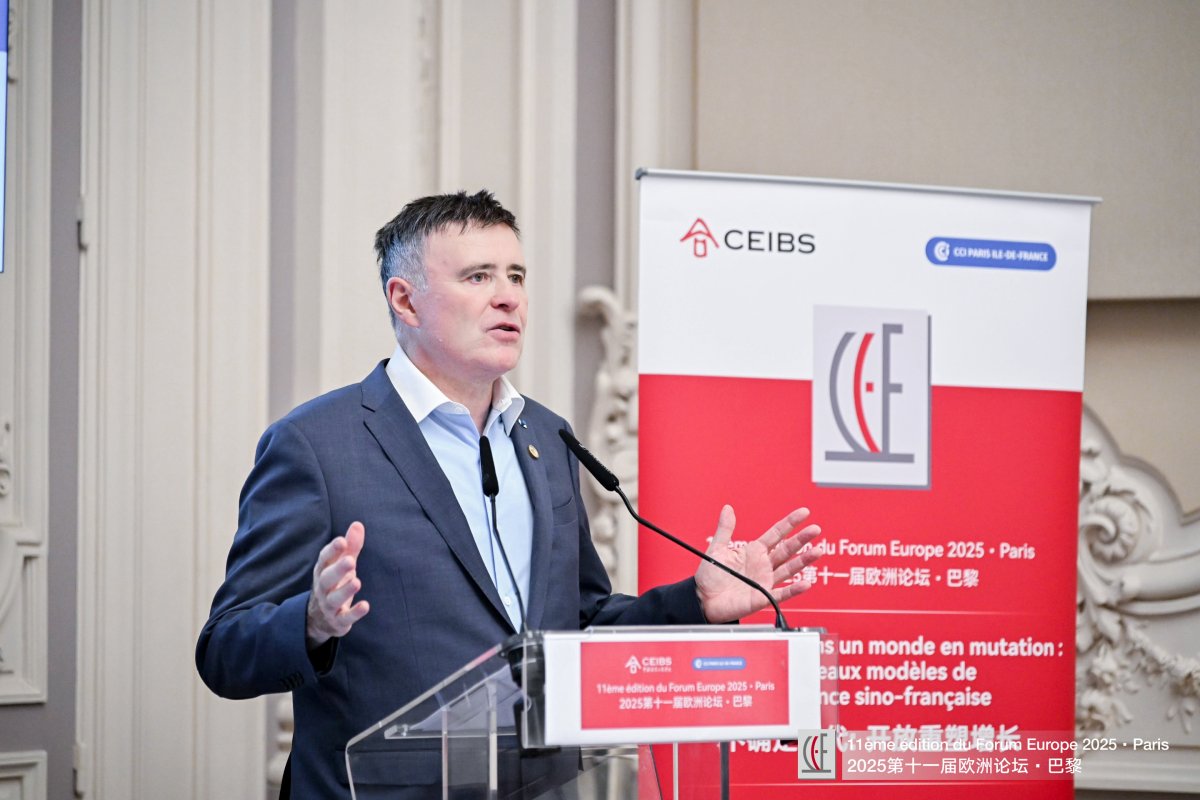Openness and mutual understanding key to realising the potential of Sino-French relations
June 30, 2025. Paris – While the relationship between China and France faces challenges from a changing international order and rising trade tensions, there remain many avenues for cooperation and collaboration if the principles of openness, mutual understanding, and the leveraging of mutual complementarities prevail, according to remarks made today in Paris at the 11th CEIBS Europe Forum.
2025 marks the 50th anniversary of China-EU diplomatic relations, a milestone that arrives amidst a global environment marked by geopolitical tension, profound economic upheaval, and growing demands for sustainability and industrial sovereignty, as enterprises face the need to rethink their business models in response to the emergence of new value chains. The openness and cooperation represented by five decades of Sino-European cooperation are key to addressing these global challenges, driving sustainable economic development, and exploring new sources of growth. Within this context, the relationship between France and China is fast taking on a new dimension.
China remains a key market which is undergoing a rapid transformation, with many multinationals embracing a new "in China, for China" strategy to better respond to changing market dynamics and integrate into rapidly evolving industrial and regulatory ecosystems. France, which continues to excel in the fields of energy, healthcare, consumer goods, and technology, is asserting its leading position in Europe through an ambitious investment policy exemplified by the France 2030 investment plan. With France offering advanced technology and expertise and China providing vast market potential and a mature industrial chain, how can both nations leverage their complementary advantages? How can the countries’ industries secure sustainable growth in today’s uncertain times? At this pivotal juncture, the 11th CEIBS Europe Forum Paris, organised by CEIBS and CCI Paris Île-de-France, convened leaders from government, business, and academia to address these critical questions and more. The forum was co-organised by the CEIBS DBA programme and was notably attended by 33 current DBA participants from China as part of an overseas module; over a week, the DBA cohort visited multiple companies and participated in high-level academic lectures and seminars across France and Switzerland.
The forum began with a welcome address via video from CEIBS President Wang Hong, who asserted that in an era of uncertainty marked by geopolitical and economic upheaval, only openness between partners can help to achieve stability in volatile times. “As we mark the 50th anniversary of China-EU diplomatic relations,” she said, “China and Europe, as two major global forces, markets, and civilisations, can inject more certainty into this uncertain era.” Noting that France is the second-largest economy in the EU and the core of innovation in Europe, and stating her belief that China and France both firmly support multilateralism and free trade and are committed to strengthening global governance cooperation, she added that economic and trade collaboration between the two countries has in recent years expanded across multiple fields, yielding fruitful results, particularly in healthcare, consumer goods, energy, and technology. In these uncertain times, she said, “the close cooperation between China and Europe, as well as between China and France, serves as an anchor of stability and a source of opportunity.” She also emphasised that the CEIBS Europe Forum, launched in 2012, is a key initiative of the school in implementing its strategy of facilitating dialogue between China and Europe, and has continuously promoted economic and cultural exchange and cooperation between China, Europe, and the world. In conclusion, she said, "I sincerely hope that today’s forum will spark new ideas and help us to collectively explore new paths forward. Let us embrace opportunity with openness, overcome challenges through cooperation, and together write a new chapter of mutual prosperity!"
President Wang’s welcome address was followed by a second delivered by Dominique Restino, President of CCI Paris Île-de-France, who asserted that “the relationship between France and China is evolving in the context of many rapid transformations, including the reorganisation of value chains, growing sustainability challenges, and the increasing emphasis on economic sovereignty. Our businesses must adapt accordingly. China remains a vital and strategic market across many sectors in which French companies excel, but it is also a market in transition, with new industrial and regulatory dynamics.” Going on to highlight globally recognised French expertise in healthcare, energy, agri-food, consumer goods, and high technologies, he added that French companies “export quality, trust, and innovation.” He emphasised that the France 2030 plan is key to the country’s efforts to strengthening its industrial sovereignty, supporting innovation, and developing sectors capable of succeeding on the global stage. “I am particularly pleased that this edition of the Forum is dedicated to the theme of openness, in the presence of a delegation of around thirty Chinese business leaders,” he added. "In times of uncertainty, openness is a strategic choice: it means dialogue, adaptability, sustainable development, and improving the business environment. This is the spirit in which the Paris Île-de-France Chamber of Commerce supports businesses, both at home and abroad; and it is in this same spirit that we intend to continue our relations with partners around the world, especially in China.”
Minister of the Chinese Embassy in France Chen Dong then delivered an opening address, emphasising the strength and potential of China-EU and China-France relations as the two sides mark the 50th anniversary of diplomatic ties. Minister Chen noted that over the past five decades, China and the European Union have built a deeply integrated partnership rooted in mutual benefit and shared prosperity. Within this framework, China-France cooperation has achieved significant progress in both bilateral trade and two-way investment. Looking to the future, Minister Chen outlined three key perspectives for deepening collaboration: embracing competitive cooperation, calling for both sides to take an objective view of each other’s development and actively embrace the “new normal” of healthy competition and cooperation, which can act as a catalyst for innovation; fostering innovation and complementarity, asserting that by harnessing complementary strengths and developing a dedicated “China-France solution”, both Chinese and French enterprises can expand their presence in global markets; and unlocking trade potential, underscoring the need to further explore trade opportunities and create a more enabling environment for mutual investment and business development, particularly through leveraging cross-border e-commerce and China’s middle class, the world’s largest. Minister Chen concluded by encouraging China and France to continue expanding openness, manage economic and trade differences constructively, and work together to usher in the next 50 years of win-win cooperation between China and the European Union.
The first keynote speech of the event was delivered by Jean-Pierre Raffarin, Former Prime Minister of France, Special Representative of the French Government for China, and Distinguished Professor at CEIBS. He emphasised the importance of mutual understanding in building a collaborative, open France-China relationship, saying that “cooperation has an adversary, and this adversary is ignorance.” Looking to the future of the France-China relationship, he asserted that “the first of our priorities should be to develop our common knowledge.” He then went on to outline the ways in which each side could improve their understanding of the other: “We Europeans must make much more effort to learn the language, to learn the culture, to try to understand what China is, while our Chinese friends must also understand what the European Union is; an innovative construction, which does not exist anywhere else, of democracies that have gathered and that naturally decide with each other through long processes.”
Noting the importance of long-term strategy over focus on current, short-term changes in the global environment, Prof. Raffarin highlighted reform of the United Nations Security Council and cooperation on the development and regulation of artificial intelligence as key areas in which China and Europe could strive to seek productive cooperation. He concluded by saying that, “we will not be good partners in the present if we do not have a vision in common for the future, and this is why I believe that intellectuals, managers, entrepreneurs, civil society, and others must work together to make sure that our day-to-day cooperation becomes more positive and constructive over the long term.”
Former Minister of Foreign Affairs of France Hubert Vedrine then gave a second keynote speech. While noting that France and China possess a relationship of “admiration, mutual fascination, tension, and more, which together tell a wonderful story”, he began by emphasising the importance of both France and China accepting the reality of today’s global environment, including the second election of Donald Trump in the US and all that it entails. Focusing on the importance of developments in America to the world order, he expressed the belief that Europe is “the most impacted by Trump”, and when discussing whether recent changes in the American-led order were short-term or more permanent, added that “I don't advise anyone to bet on the return of our pro-globalisation American friends,” asserting that “we live in a different world, but the impact is not the same for everyone.”
He went on to outline the ways in which these developments could complicate the relationship between Europe and China, adding that there was disagreement within Europe on the issues, stating that “the Europeans are divided on this, with a relative majority for the moment saying that we have to protect ourselves more from China, and a dynamic minority saying no, it's not intelligent, maybe we must protect ourselves, but overall we must cooperate.” Noting “difficult moments to come,” he said that these issues were precisely why a robust France-China relationship is important. Concluding that the current disruption presented opportunities for France and China to cooperate more effectively, he noted that the green transformation and technological development presented key areas for potential mutual development, emphasising France’s “top-level expertise” and China’s “incredible capacity” in technology like EVs.
This was followed by the first panel discussion of the day, based on the topic “Open Opportunities in France-China Healthcare”. The discussion was preceded by a keynote presentation by Olivier Veran, Former Minister of Solidarity and Health of France. Highlighting China’s rapid development in healthcare innovation, he focused on the ways in which healthcare presented a unique opportunity for cooperation between China and Europe. Emphasising the effectiveness of both European regulation and China’s recent advances in innovation, he outlined how each country could learn from the other to build an effective collaborative model: “these cooperations can make China and Europe partners and world leaders in the long term; China needs to access the European market, and Europe needs to work more with the innovation that can be found in China.”
The following panel, moderated by CEIBS Professor of Entrepreneurship and Deputy Director of DBA Programme Terry Wang, featured Mr. Veran, Chairman of Jinglin Medical Group Hainan Co., Ltd. and CEIBS DBA2024 participant Jun Dai, CEO of Colisée China and Co-President of the French Healthcare Alliance Olivier Dessajan, and Chairman and CEO of Apeloa Pharmaceutical Co., Ltd., and CEIBS DBA2024 participant Brian Zhu.
Marc-Antoine Jamet, Secretary General of LVMH, opened the second panel with a reflection on the evolving dynamics between China and Europe in the world of luxury. Recalling key milestones in LVMH Group’s presence in China, he emphasised that this partnership is rooted in a long-standing cultural fidelity and anchored in a long-standing exchange of traditions and ideas. Speaking of the aspirations of China’s young, connected and discerning generation, he championed a vision of luxury built on authenticity, responsibility, and shared innovation, adding that China is more than a mere market conquest, but a “demanding mirror” that drives luxury houses to reinvent themselves. Acknowledging current points of tension - including technical standards, cultural sovereignty, diplomatic frictions - he reminded the audience that the long history between France and China calls for “turning obstacles into cooperation, and dissonance into resonance.” He concluded with these words: “Luxury is not a language of pride, but a shared idiom- a bridge between cultures. It is up to us to continue crossing it, together, with intelligence, respect, and purpose.”
The subsequent discussion was moderated by Professor of Organisational Behaviour, Associate Dean (Europe) and Director of Hospitality EMBA, DBA, and CCEMBA Programmes Katherine Xin, and featured Mr. Jamet, CEO of Isabel Marant Anouck Duranteau-Loeper, General Manager of La Chablisienne Damien Leclerc, Co-Founder and President of Caudalie Mathilde Thomas, CEO of Genhigh Tech and CEIBS DBA2023 participant Zhonglin Wang, and President of Shanghai Moonton Technology Co., Ltd. and CEIBS DBA2024 Mr. Yunfan Zhang.
CEIBS President (European) Dominique Turpin then gave closing remarks. Offering his personal reflections on the events’ speeches and discussions, he said, “I am a marketing professor, so everything I heard today was music to my ears; this is because to do good marketing, you have to create value, and you create value by solving problems. Today, there are many problems in the world, but fortunately, we have innovation, we have creativity. I think there are also many complementarities between China and Europe, and France in particular.” He then added that, in order to implement the principles of openness in France-China business relations, “we must hire as many talented people as possible, including young people, and I think that in businesses too we must engage as much as possible all the social benefits that we can generate through business.”
The event was hosted by CEIBS Dean and Vice President Frank Bournois, himself a French high civil servant. In opening the forum, he noted that, “in 2025, we are celebrating the 50th anniversary of diplomatic relations between Europe and China, but we are also at the heart of great uncertainties from the economic and global point of view of geopolitics,” highlighting CEIBS’ key role as a facilitator of academic exchange between Europe and China in combating global uncertainty.
China Europe International Business School (CEIBS)
China Europe International Business School (CEIBS) was jointly established in 1994 by the European Union and the Chinese government and remains the only business school in China founded through government-to-government collaboration. Guided by its motto of “Conscientiousness, Innovation, and Excellence,” CEIBS is committed to developing responsible leaders equipped with “China Depth, Global Breadth”. The school has established a global footprint across five locations on three continents - Shanghai, Beijing, and Shenzhen in China; Zurich in Switzerland; and Accra in Ghana - becoming a top-tier business school in Asia and a globally recognised institution. CEIBS also serves as a bridge for economic and cultural exchange between China, Europe, and the wider world. The school offers a wide range of programmes, including a full-time English-language MBA, Finance MBA (FMBA), Global Master in Management (Global MiM), EMBA, Global EMBA (GEMBA), Hospitality EMBA (HEMBA), Doctor of Business Administration (DBA), PhD, and Executive Education (EE) courses. CEIBS was the first business school in mainland China to earn accreditation from both the European Quality Improvement System (EQUIS) and the Association to Advance Collegiate Schools of Business (AACSB). For nine consecutive years, CEIBS has been ranked the No.1 MBA programme in Asia in the Financial Times Global MBA Ranking, while its Global EMBA programme is currently ranked No.1 in the world in the Financial Times EMBA Ranking.







